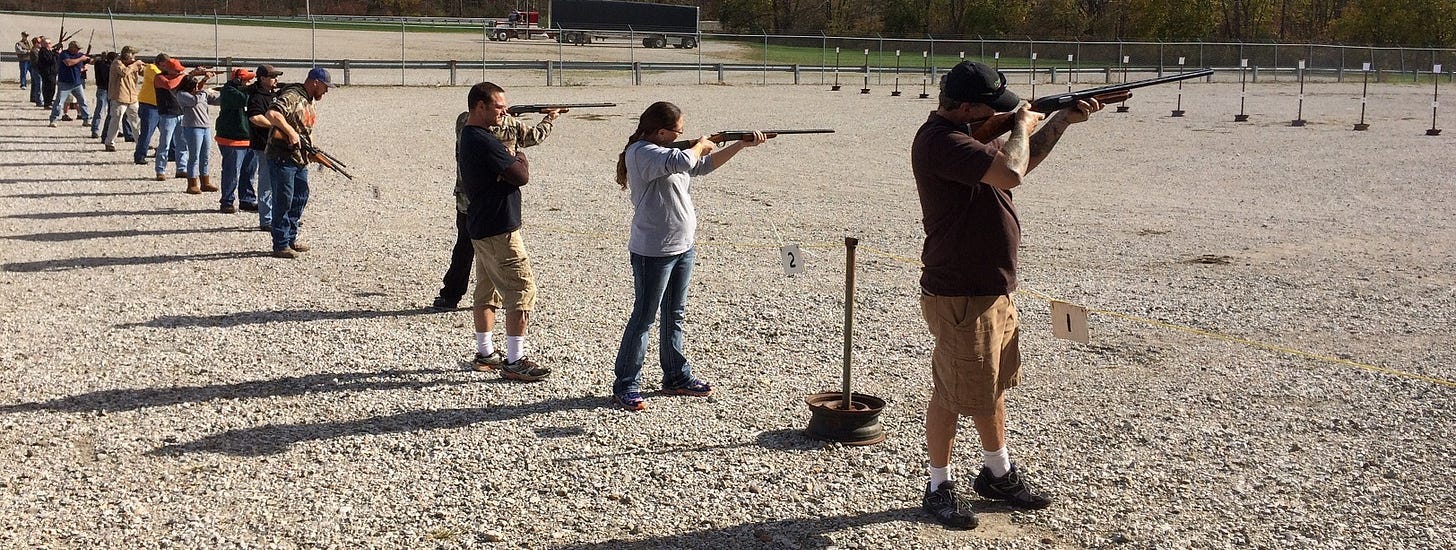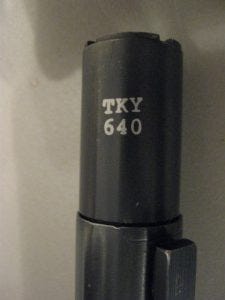Turkey Shoot 101: No Birds, Just Fun
You’ve probably seen the signs as the leaves fall. Turkey Shoot they proclaim. Indiana has a lot of them. But, most Hoosiers don’t have a clue what they are. WildIndiana is here to give you the 411 on this Hoosier tradition.
A turkey shoot in many cases is just that, a shooting contest to win a turkey. In many cases the club or organization also gives out hams, sausage, roasts, and other cuts of meat. Occasionally they award cash prizes.
Before you feel defeated without even trying, a turkey shoot in ten-percent skill, ten-percent equipment, and eighty-percent luck. All it take is one pellet in the right location to win so anyone from beginner to veteran can win any game at any time.
While not all games are identical, they have some common rules:
Shotguns are used, generally 12-gauge, but often 16 and 20-gauge are acceptable.
The range is usually twenty-five yards.
The target is usually a stationary paper card or plywood square.
The club supplies the ammunition.
The whole family has fun.

Turkey Shoots are a Hoosier tradition for the whole family.
Here’s how most games are ran:
Shooters pay the game fee of a few bucks and pick a numbered position on the range.
The shooters receive a token with the game and positon number.
An attendant places the targets on the range.
When the game number is called, the shooters go to the firing line and stand at their numbered position.
An attendant will travel down the line and give out one shotgun shell to each player.
Once every player has their shell, the range officer calls the range “hot” and shooters fire at their corresponding marked target.
When all shooters have fired, the range officer closes the range. The shooters case or otherwise make their weapons safe.
The targets are collected and scored in front of the shooters.
The target with the pellet hole closest to the center X wins the round and the prize.
Three key points to make: LISTEN to the range officers. Don't load your firearm or shoot until they say so. ASK questions if you don't understand the rules or range officers' commands. SAFETY comes first, so always keep the chamber open and the muzzle pointed in a safe direction when not in use.
You can't get much closer than that!
While a turkey shoot is mostly luck, there are some ways to tilt the odds in your favor.
Get familiar with your shotgun well before the shoot. Learn to look down the shotgun barrel and get a good site picture.
Pattern your shotgun before attending a shooting match. Shoot a target load at a large paper or cardboard target at 25-yards and find the center of the pellet pattern. Use this information to adjust how you aim. Open iron sights are usually allowed so if your shotgun has them, adjust them to bring the center of the pellet pattern to the target X.
Use a 12-gauge over a 16 or 20-gauge shotgun. A 12-gauge shell hold more pellets, thus increases the chances of hitting the X.
Use a tighter choke such as a FULL or Turkey choke. A tighter choke concentrates the pellet pattern into a smaller area, which gives you a better chance of hitting the X.

This turkey choke is very tight at .640". Some clubs won't allow it because they feel it gives the shooter an unfair advantage.
Some shoots have different classes and allow or not allow certain firearms or accessories in them.
An open class may mean anything goes and folks often bring custom-built, turkey-shoot shotguns with ultra-long barrels, back-boring, and telescopic sights.
Smaller, local shoots may try to make it better for the “average Joe” to be competitive. Often they are closed to anything but common factory barrels with no sighting aids, in other words, the same shotgun the owner uses for hunting. A range officer may even check chokes with a gauge to make sure they aren’t too tight.
Before we close, here’s a few other tips to include all family members in the fun. Generally a 20-gauge shotgun has less recoil than a 12-gauge and may be best to introduce new shooters to the sport. A semi-automatic shotgun often feels softer to shoot over a pump or bolt-action shotgun. Recoil sensitive shooters are less likely to get recoil shy when using them.
So, what are you waiting for? The next time you see that flyer in the local market or a sign pointing to a conservation club turkey shoot, get in the game and have fun. And remember, it only takes one pellet to win the match, and it really could be you.
Link:
Turkeyshoot.net - Geared to the competitive shooter, more info than you'll ever need!


